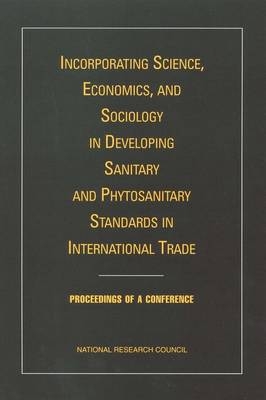
Incorporating Science, Economics, and Sociology in Developing Sanitary and Phytosanitary Standards in International Trade
National Academies Press (Verlag)
978-0-309-07090-4 (ISBN)
- Keine Verlagsinformationen verfügbar
- Artikel merken
Any effort to manage sanitary and phytosanitary (SPS) issues in international trade must integrate all the sciences to develop practices for risk assessment, management, and communication that recognize international diversity in culture, experience, and institutions. Uniform international standards can help, but no such norms are likely to be acceptable to all countries. Political and administrative structures also differ, causing differences in approaches and outcomes even when basic aims are compatible. Clearly there is considerable room for confusion and mistrust. The issue is how to balance the individual regulatory needs and approaches of countries with the goal of promoting freer trade. This issue arises not only for SPS standards but also in regard to regulations that affect other areas such as environmental quality, working conditions, and the exercise of intellectual property rights. This conference focused on these issues in the specific area of SPS measures. This area includes provisions to protect plant and animal health and life and, more generally, the environment, and regulations that protect humans from foodborne risks.
The Society for Risk Analysis defines a risk as the potential for realization of unwanted, adverse consequences to human life, health, property, or the environment; estimation of risk is usually based on the expected value of the conditional probability of the event occurring times the consequence of the event given that it has occurred. The task of this conference and of this report was to elucidate the place of science, culture, politics, and economics in the design and implementation of SPS measures and in their international management. The goal was to explore the critical roles and the limitations of the biological and natural sciences and the social sciences, such as economics, sociology, anthropology, philosophy, and political science in the management of SPS issues and in judging whether particular SPS measures create unacceptable barriers to international trade. The conference's objective also was to consider the elements that would compose a multidisciplinary analytical framework for SPS decision making and needs for future research.
National Research Council
1 Front Matter; 2 Overview; 3 1 Historical and Social Science Perspectives on the Role of Risk Assessment and Science in Protecting the Domestic Economy: Some Background; 4 Part I: Agricultural Trade, Risk Assessment, and the Role of Culture in Risk Management; 5 2 Sanitary and Phytosanitary Risk Management in the Post-Uruguay Round Era: An Economic Perspective; 6 3 An Overview of Risk Assessment; 7 4 Technological Risk and Cultures of Rationality; 8 Part II: Political and Ecological Economy; 9 5 Biological Impacts of Species Invasions: Implications for Policy Makers; 10 6 Risk Management and the World Trading System: Regulating International Trade Distortions Caused by National Sanitary and Phytosanitary Policies; 11 7 Accounting for Consumers; 12 Part III: Case Studies; 13 8 Case Study 1: Meat Slaughtering and Processing Practices; 14 9 Case Study 2: Plant Quarantines and Hass Avocados; 15 10 Case Study 3: Genetically Modified Organisms; 16 A: SPS Agreement; 17 B: Conference Program; 18 C: Program Participants; 19 D: Conference Participants
| Erscheint lt. Verlag | 1.7.2000 |
|---|---|
| Zusatzinfo | Illustrations, map |
| Verlagsort | Washington |
| Sprache | englisch |
| Maße | 152 x 229 mm |
| Themenwelt | Naturwissenschaften |
| ISBN-10 | 0-309-07090-2 / 0309070902 |
| ISBN-13 | 978-0-309-07090-4 / 9780309070904 |
| Zustand | Neuware |
| Haben Sie eine Frage zum Produkt? |
aus dem Bereich


